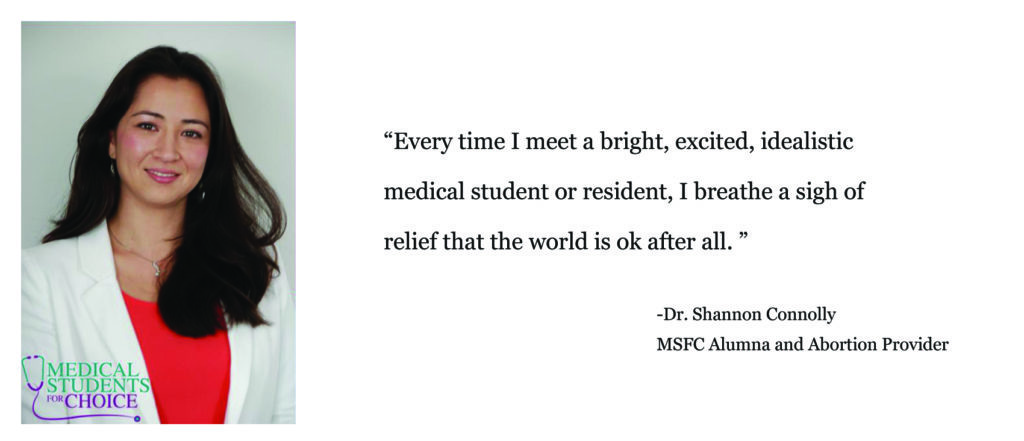I’m not sure that many people grow up thinking, “When I grow up, I want to be an abortion provider,” but I do think that a lot of people can imagine wanting to be a doctor so they can help others. For me, there are very few opportunities in medicine where a provider can offer a very basic and simple service to a patient who is in a very difficult situation and literally give them their life back. For the most part, patients are so grateful and relieved. It also provides a powerful opportunity to connect, offer resources, and empower a patient by teaching her how she can manage her fertility after the abortion.
After college, I worked for several years at a Planned Parenthood. Although initially I took the job because I am pro-choice and care about access to good comprehensive health care, the patients that I met gave me a clear new directive in life. For the first time I understood on a far more sophisticated level what the consequences of poor access to health care were and what the circumstances are of many women who are seeking abortions. I answered a hotline and I spoke to women all around the country who were looking for abortion services, and I realized how difficult it was to get accurate information, to find the clinic or a doctor that would provide the service, and to actually get there and pay for the abortion.
Abortion can be the last line of defense for women who live in desperate circumstances. Protecting abortion access—or rather, the right to choose whether and when to become a parent, is to me one of the most important components of my work in social justice. I believe that empowering women and their partners to manage their fertility successfully leads to stronger, healthier, communities where young people and adults have more opportunity to pursue their goals, and better circumstances if they decide to welcome children into their lives.
During medical school, I did research in contraception and became very involved in Medical Students for Choice, both in my local chapter and on the National Board. I attended a lot of reproductive health conferences and used every opportunity I could to network with abortion providers and other people who were interested in family planning. I did a Reproductive Health Externship in my fourth year to get more experience as well. In residency, worked with some of the mentors I had identified as a medical student and was able to set up almost all of my elective time for abortion and family planning training. Because of the relationships I had built over the years, a number of wonderful physician educators took me under their wings and I was able to train up to competency. After graduating from residency, I was very fortunate to get a job in a place that continued to support my education and training as well.
I am a family doctor, so my daily practice is a primary care clinic, where I see patients from all walks of life for all sorts of problems and preventive medicine services. If one of my primary care patients needs a medication abortion, I provide that service in my regular clinic. Once or twice a month, I also drive to another clinic about 60 miles away and provide surgical abortion services.
Without MSFC, I’m not sure if I would have been able to fulfill my dream of becoming an abortion provider. My medical school and residency curricula failed to educate me adequately about family planning and abortion care, so I had to seek out that education elsewhere. MSFC provided me with that knowledge–through lectures, conferences, externships, and most importantly, a community of great people who were always there for me. My work with MSFC laid the groundwork for getting involved in political advocacy, which is something that is very important to me now.
We, need to educate ourselves about the realities of poor abortion access, both so we can work to ensure that abortion will always be legal in the US and so we can advocate for our sisters in areas of the world where limited access represents a human rights emergency.
From a policy perspective, the past couple years have been devastating for abortion access in America. The sheer number and reach of TRAP laws that have been introduced and passed across the country have done more to erode access than at any other point in my lifetime. I am worried that the average person does not understand that there is a tremendously powerful political machine working in overdrive to create seemingly innocuous legislation that is in fact making abortion impossible for the most vulnerable women. This trend will only continue without a massive, coordinated, counter-movement.
Every time I meet a bright, excited, idealistic medical student or resident, I breathe a sigh of relief that the world is ok after all. I know many talented students and residents that understand the importance of abortion access and are committed to dedicating their careers to making a difference. When I look at how much Medical Students for Choice has grown over the years, and I see that there are now chapters in some of the most anti-choice places in the country and even the international community, I feel so proud of those students. They are working the movement, they are forcing change, and they are very, very brave.
As the saying goes, “if not you, then who?”

